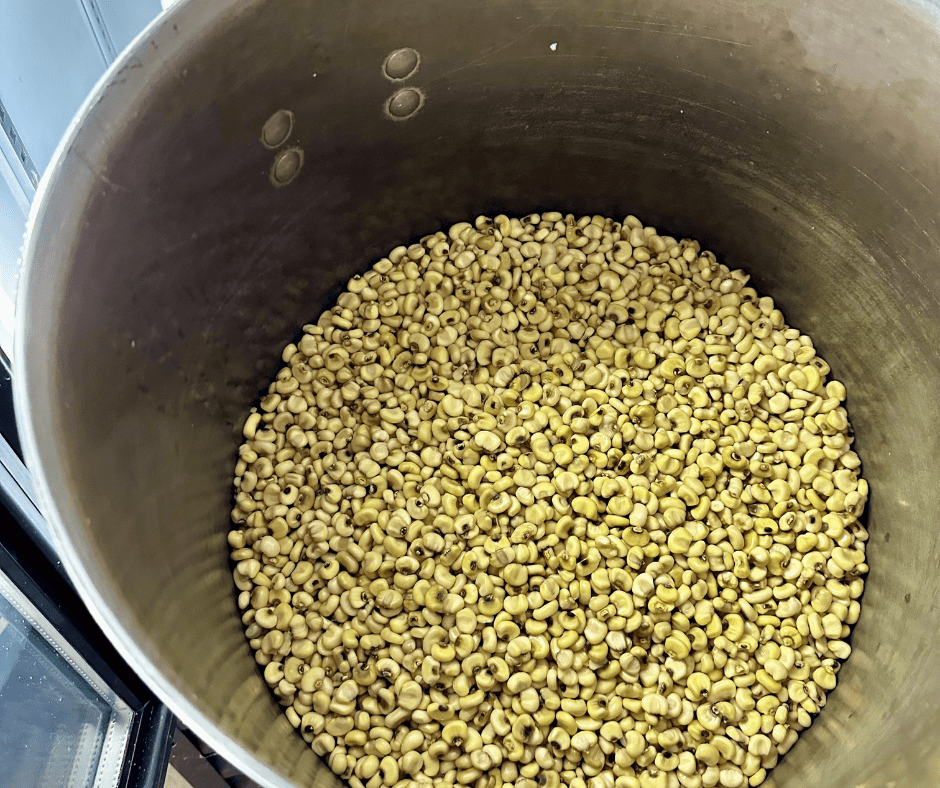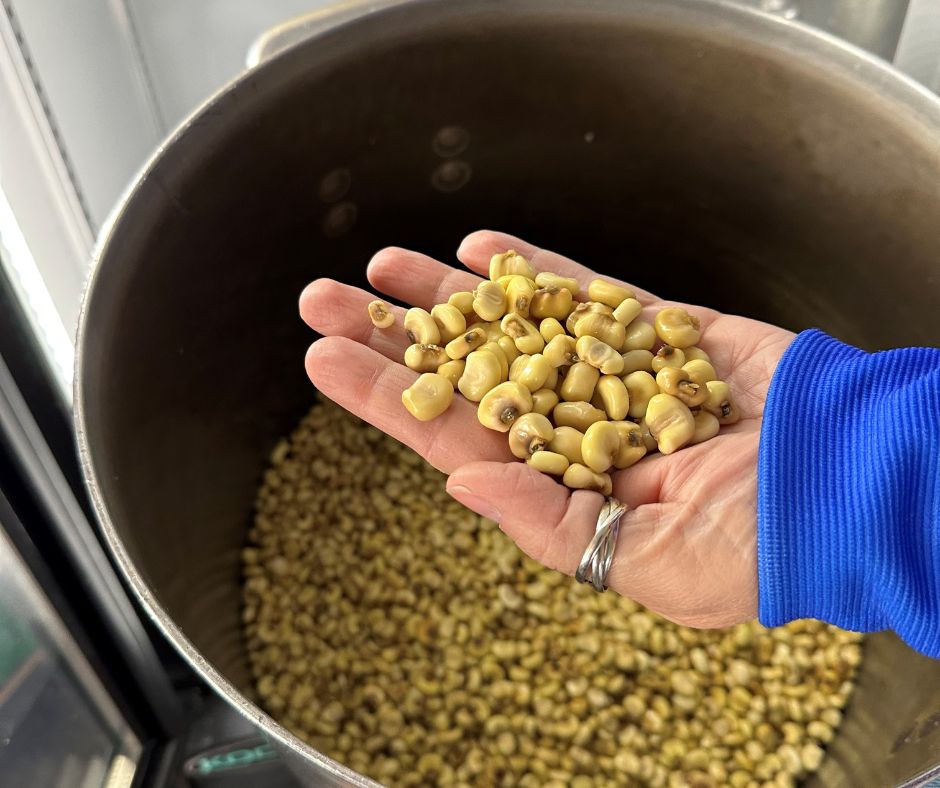In Six Nations of the Grand River, Hill’s Native Foods has been a staple in the community for generations.
Discover the Story of Hill’s Native Foods in Six Nations of the Grand River
When Kris Hill was less than 10 years old, she remembers her parents working to process white corn on the woodstove in their back breezeway of the family home. They were the originators of Hill’s Native Foods.
The Origins
Her dad would plant the corn and the family would then harvest it and shell it by hand. Her mom would process the corn and make lyed corn and corn bread, and they would supply a number of local variety stores throughout the Six Nations community.
Over time, the business transitioned with the times and the availability of family members to help. There was a hand crank corn sheller that was ultimately phased out, a wood stove that eventually became a gas stove for more processing, and all of the kids, ranging in ages, helping their parents meet the local need.

Through the years, her mom went back to school as the older kids moved out to start their own families and careers. She recalls that the youngest, Scottie, was still at home helping their dad with the business. Eventually, their parents both retired, and Hill’s Native Foods moved to Scott’s home. He then took over planting. If he needed extra help, she was available to assist.
At the time, Hill’s Native Foods was supplying 10 variety stores (including Route 54 Variety & Gas – her own family business) local restaurants and meeting high demand during holidays and special life events. The business was consistent, and the customer base relied on their product together with one other local producer to effectively meet community demand. And then, the pandemic appeared on the horizon.
Back to Family Roots
When looking back at this time in history, readers may recall hearing one of two reactions: “This was a period of growth for me,” or “Things were quite scary for me at this time.” The Six Nations community took an added approach to pandemic restrictions by physically installing barricades and checkpoints for access into and out of the territory, and thankfully, the former statement seemed to prevail.
For the most part, families were adapting to current gathering restrictions and learning or revisiting old ways. They were planning and growing gardens, cooking homemade meals, canning, and taking time to do things they long hadn’t had time for before. This included growing and processing their own white corn at home.

Hill looked back at this time with a positivity one doesn’t often hear from independent food producers, let alone for product typically found at large gatherings, in restaurants, or at life events where several generations would attend. She recalled with pride the number of neighbours and community members who were planting their own white corn, processing it, and sharing it with family and friends when they could. She noted the orders that were once consistently 100-200 bags each ebbed and flowed over that time, when the words “lockdown” and “quarantine” became a regular part of everyday life.
Community Knowledge Sharing
Hill’s Native Foods found a stream of continued community service in knowledge sharing. “The farming community is just that – a community. In addition to farming, it includes any type of agricultural business such as fertilizer places, soil testers, and home gardeners. They want to see you succeed. And, if you’re not, they want to learn from it and try to help. And that’s what happened over the course of the pandemic. That knowledge was fostered, and the corn was planted and grown by people in the community that just needed to do it for themselves at that time,” she mentioned.
After the lifting of gathering restrictions and life relatively returning to “normal,” orders began to ramp up. She identified that Scott was doing well keeping productivity constant in addition to many other projects he had on the go. He was not only doing the planting but also the processing and cooking. And when orders would get low and she identified needing product for her own store as well, she would often offer to help over at his home where the business was being coordinated. When it seemed difficult for him to keep up, she then made the suggestion to move the business to her home and continue it under the family name while maintaining its consistent productivity.

With that, she purchased the equipment that Hill’s Native Foods had grown into and used for planting, shelling, and processing. Over the course of 2 years, she worked with the space she had at her home, incorporating a kitchen, teaching her daughters the processes, and taking the lyed corn to her location. As a family, they continue to maintain the integrity of the seed, cooking, producing and delivering on the original product her parents started. And breaking down silos (figuratively,) to share seed source, planting, and soil information for those that wish to learn.
“Giving that seed the best opportunity to grow and produce is what that knowledge is for. When a farmer and the corn have its own community, why would anyone choose to work in isolation? Maintaining the integrity of the seed, learning to rotate crops no matter the size of your garden or field, and sharing that knowledge for generations to come only makes sense,” Hill explained.

To that, she adds that one of her daughters bakes excellent Indian cookies and doughnuts. As such, they can grow the business in commodities relevant to the community and to others who wish to experience them, and they can modernize the corn production to a degree, while maintaining the integrity and knowledge-sharing piece. Hill herself hopes to do workshops, school demonstrations, and community presentations, with the potential to keep the business in the family but also diversify and hire other community members who wish to learn and grow with it as well.
Her future plans within Six Nations are not yet set in stone. However, she welcomes the opportunity to share traditional Haudenosaunee lyed corn and corn bread as well as one of the best bowls of corn soup you would hope to experience, for sale at her family store. Bags of Hill’s Native Foods white corn and corn bread will also continue to be available in local businesses within the community, at local restaurants for their menu items, as well as for sharing with family and friends.
Hill’s Native Foods corn products are available for purchase at Route 54 Variety & Gas (at 1086 Brant County Hwy 54,) in addition to a number of other variety stores located in the Six Nations community. You can also purchase homemade corn soup at the store every Wednesday or sit down to a delicious bowl together with ham and scone specials at area restaurants. For more information or availability, visit the Route 54 Gas & Variety Facebook and Instagram pages, and watch social media for upcoming workshops and community demonstrations.




